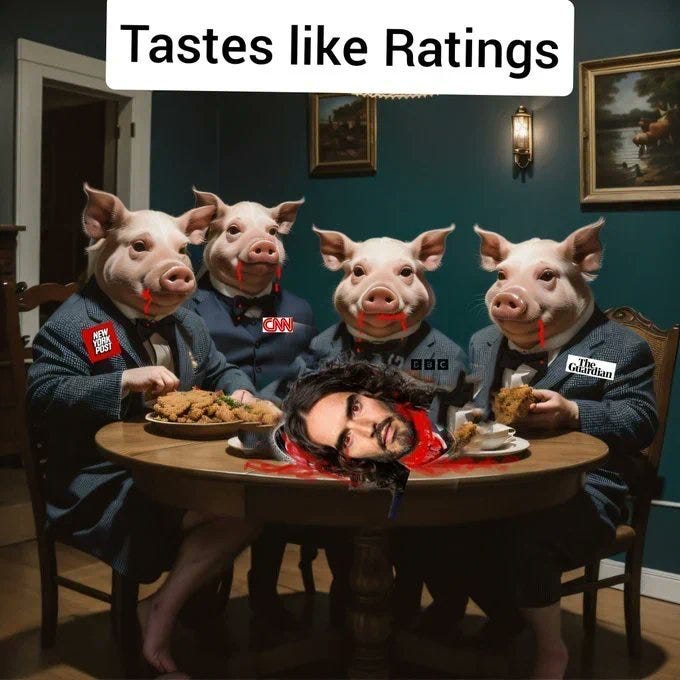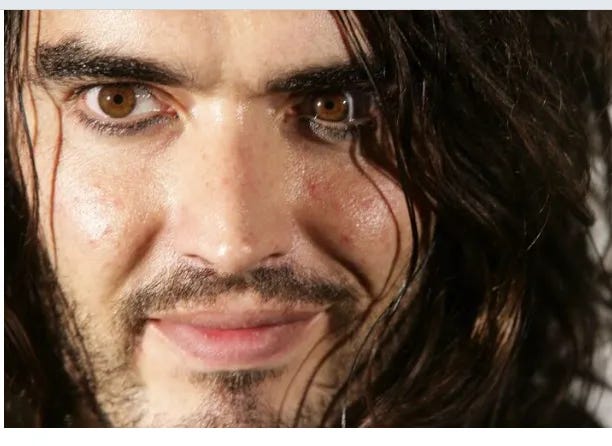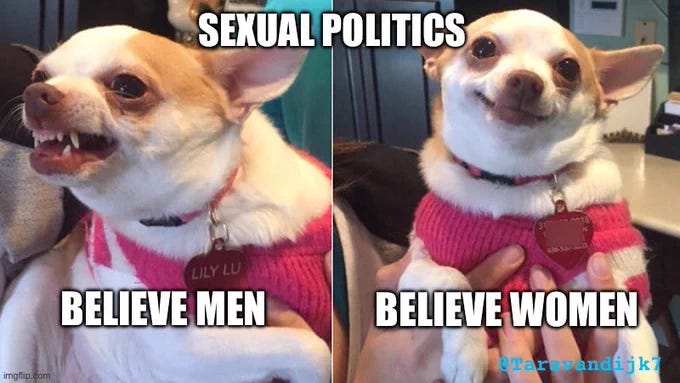Russell Brand, British comedian and mainstream media critic, was subjected to a trial by media in September 2023. Accusations surfaced against him alleging rape, sexual assault, and emotional abuse over a seven-year period during the peak of his fame. However, Brand denies the allegations, has not been criminally charged, and there is no indication that police are actively investigating these claims.
Regardless of our personal feelings about Brand, or about the allegations made via the media (and social media) against him, the truth or falsity of the accusations remains unknown. These allegations were offered anonymously on sympathetic platforms and have yet to be scrutinized by the police or tested in court. This post will explore what this latest trial by media reveals about how and why consent can be manufactured so quickly about issues we do not have direct knowledge of.
Manufacturing Consent
Manufacturing consent refers to the process of mobilizing and solidifying bias without state censorship. Herman and Chomsky (1988) outlined a propaganda model explaining what counts as ‘news’ and how victims of state violence are categorized as worthy or unworthy based on media coverage. They demonstrated how victims generated by the US or its allies received less news coverage and empathy.
In Brand’s case, it's illustrative to compare the media blitz against him to the relative lack of attention given to men associated with Jeffrey Epstein or those who traveled on his ‘Lolita Express’. Furthermore, the media's concern for the mental health of Hugh Edwards and Philip Schofield contrasts sharply with the treatment of Brand, a recovering drug addict whose pregnant wife and two young children have received little consideration. The media's differential treatment of accusers also highlights this bias, as seen in the different handling of Tara Reade’s allegations against Joe Biden in 2020. This demonstrates the media’s power to determine who is a worthy or unworthy accuser and who is presumed innocent until proven guilty versus guilty as soon as accused. Indeed, the Channel 4 “documentary” used actresses to protray the four women who accused Brand of sexual misconduct to sex crimes in The Times article.
Herman and Chomsky identified five filters that affect media content: Scale, Ownership and Profit; Revenue Model; Sourcing; Ideology and Politics; and Flak. These filters influence which stories become big news, which are buried, and whose voices are privileged.
Profit, Ownership, Scale
“The News” has become profit-oriented. News programs, once subsidized by entertainment divisions, now prioritize stories that generate profit through attention-grabbing, sensational coverage. Corporate ownership of media further biases content, as journalists avoid angering their employers. For example, Jeff Bezos’s ownership of The Washington Post likely affects its coverage of Amazon-related stories. The concentration of media ownership also amplifies this bias, as seen in the widespread coverage of the allegations against Brand.
Revenue Model
Advertising is the main revenue source for mainstream media, making consumer attention the product. Content that attracts high advertiser value, such as sex scandals and falls from grace, is prioritized. This model discourages coverage of topics that advertisers find problematic.
Sourcing
Cost-free information is ideal for for-profit media. Coverage of the Brand allegations all come from one four-year investigation by The Times. Notably, the article and documentary excluded women who had no complaints about their interactions with Brand, raising concerns about selective reporting.
The choice of accompanying images also fits the sex predator narrative, avoiding recent, more positive pictures of Brand.
Ideology and Political Agendas
When The Manufacturing of Consent was published in 1988, anti-communism and pro-capitalism were dominant in the West. Today, criticism is acceptable in specific areas but not against the system as a whole. Brand’s critiques of the status quo and legacy media have made him a target. The media campaign against him was not initiated by police charges but by journalists in 2019, after Brand had shifted from being a liberal favorite to being labeled a “right-wing conspiracy theorist”.
If Brand’s views had remained within the liberal consensus, would this four-year investigation into his sex life have been undertaken?
The media's treatment of accusers as victims or survivors preemptively validates allegations. This contributes to a slippery slope toward accuser tyranny, where untested claims are assumed true.
Flak
When a culture of gotcha or trial-by-media reporting develops, those who do not engage in this culture, especially those who openly critique it, will face opposition. ‘Flak’ is an informal disciplinary practice that encourages a ‘go along to get along’ ethos. You do not have to engage in the trial by media or the weaponization of accusation, but you ought not try to disabuse others from doing so. No buzz-kills!
Journalists like to regard their profession and its institutions as self-determined and about “getting at the truth” or “holding power to account.” When this coveted self-understanding is challenged, directing flak towards those bringing up inconvenient or uncomfortable questions likely follows. Accuser culture, mentioned above, can be used as a cudgel to discipline would-be dissenters.
Citizens who haven’t jumped on the “Brand is guilty” bandwagon or who are critical of accuser culture also catch flak for raining on the schadenfreude parade. There is a Depp v. Heard redux in the making. There are already warring #brandisinnocent and #brandisguilty hashtags based solely on feeling and tribal affiliation.
Mention that you find the timing and content of these allegations to be too “just so” not to scrutinize, how treating women as hapless victims with no agency or responsibility for their sex lives is not empowering, or that allegations are by definition untested claims, and you will likely be called a rape apologist or a similar smear online.
In other words,reasonable questions or concerns about our trial-by-media, accusation industry or the fraught state of sexual politics are likely to be turned into a moral referendum on the person raising them. This, of course, stiffles dissent and gives the impression that all “the good” are on the same page.
Critical Questions
Applying Herman and Chomsky’s propaganda model to the Brand allegations raises five critical questions:
How is the scale and structure of corporate media conglomerates filtering this story?
How is the revenue model filtering this story?
How did sourcing filter this story?
How is accuser culture and vested interests of the status quo filtering media coverage?
How does flak keep concerned journalists and citizens from raising their heads above the parapet?
The manufacturing of consent does not render these allegations false, but it does mobilize bias in advance of due process, skewing public opinion towards a particular narrative. The coverage invites us to believe that Brand is guilty, echoing Peter Ramsay’s prescient statement on the presumption of innocence:
When people who do not have direct evidence concerning Brand’s alleged offenses assume his guilt, they reveal themselves as sharing the qualities of a state that does not maintain the presumption of innocence in its legal procedures.
Follow-up Morbid Symptoms Podcast
The Allegation Industry and Trial by Media













